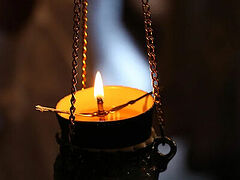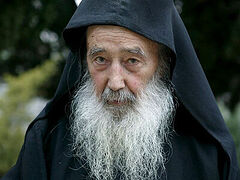We have forgotten how to give praise. We still manage to praise children somehow. But as for adults, our “praise” is almost always tinged with flattery or envy.
We don’t praise God at all. We are used to asking Him for things. Many have learned to give thanks to God, and this is great. But praising Him is something we clearly do not know how to do. We do not often hear sermons about how we are called to give praise to God. But praising God is not flattery. It is an acknowledgment of His power, wisdom, holiness, kindness and love. If there is no acknowledgment of all these, then there is no faith in God’s help, in His Providence and in salvation that comes from the Lord.
You will probably be surprised, but our Orthodox service is built on praise. We have the Great Doxology and the Small Doxology. The latter is used at the end of almost every prayer: “Glory to the Father, and to the Son, and to the Holy Spirit, now and ever, and unto ages of ages. Amen.” This is the acknowledgment of the greatness of the Holy Trinity now, always and forever. Amazingly, the entire Liturgy is imbued with the spirit of praise. The first two psalms sung at the Liturgy, “Bless the Lord, O my soul,” and “Praise the Lord, O my soul,” are a call to our entire being to glorify the Greatness of God. The first exclamation of the Liturgy encourages us to wake up and stand before the greatness of God’s Kingdom.
Praising God does not involve flattery. The greatness of God cannot be exaggerated. Praise of God is a statement of His might. But why should we praise Him?
God is all-sufficient. He does not need our praise. Another thing is that to praise God is necessary for our (human) good. The reason is that man tends to be attentive to something great. We quote the classics and say, for instance, “Dostoevsky said that...” or “Shakespeare observed that...” So, if we are attentive to God as to our Father Who is infinitely great, we cannot help but praise Him. If we are truly attentive to His Word, we will be guided by it as by our Heavenly Father’s best advice.
We love to share the great achievements of humanity. It gives us a sense of significance. And it’s pleasant for men to know the winners of their favorite sports. I was even a witness of an argument when the personality of the winner of a particular league was being discussed. How great our sense of significance will be when we come to realize the infinite depth of God’s Love for us—He gave His only begotten Son for our salvation! How can we not give thanks after that to the Love of the Father and the obedience of the Son? I now can breathe, and was forgiven and delivered from death because Christ gave all this to me at the cost of His suffering, humiliation, and death. At the cost of fighting the powers of hell.
We are called to bliss in Paradise. The King of Heaven awaits us for the feast, He has called us His “children”. How can we be silent after that? We praise God’s feats and wisdom in the work of our salvation. King David only foresaw that, but he already gave praise to Him: Let my mouth be filled with Thy praise and with Thy majesty all the day (Ps. 70:8). St. Athanasius the Great observed that by “the majesty of God” St. David meant the work of Christ’s Incarnation and Redemption. God filled the whole earth with His glory through it. You may go around the globe, but you will not find such Love of God for man in any other religion.
Man stands in awe before greatness. We marvel at the beauty of nature, at the scenery of mountain ranges from a bird’s eye’s perspective. There are specific word combinations that express our feelings: “It took my breath away”, “I am speechless / find no words to describe it”, “Ineffable beauty”. How many songs we have composed about the Fatherland, about fields and “leafy groves”, singing of earthly love! In connection with this, we should understand that “Alleluia”—”Glory to God”—is a serious thing of enormous weight. It is a word not to be thrown around; it is a word intended for prayer. “Glory to God!” is praise of the Creator of the worlds and the Creator of our hearts.
The main enemies of praise of God are vanity, envy, and pride.
Man is prone to vanity, and envy and pride are characteristics of the devil. To overcome vanity it is necessary to attend church services, to pull yourself out of everyday routine. Stand before God in praise. Collect your thoughts in prayer. Don’t think about anything, but be before the Father’s Face.
We like everything great that surrounds us, unless envy is mixed with it. Only envy can stand sullenly where all are rejoicing in victory. It alone is incapable of acknowledging merit. And then there is pride, which will praise “its own swamp,”1 without noticing “beautiful valleys” around it. Satan, the father of envy and pride, cannot praise God. And he teaches this to all who are proud and envious. Our word is about praising God. The cure for the infection of these sins is in the Church. It is faith in Divine Providence and gratitude for what you and your loved ones have.
A great book that can teach us to give praise is the Psalms. It also has another name: The Book of Songs of Praise. The Psalms are a sea of praise. This book praises God for everything visible and invisible, nature, all the elements, and the whole of Creation. From snow to field animals, everything here is full of praise.
To learn how to praise the Lord you need to know the Psalms. “The Psalms of Praise” must be understood thoroughly. Here the psalmist invites us to become like angels, to stand before the throne of God and praise Him.
We know it is human nature to share something wonderful. So the Psalms teach us to share in praise of God—to praise Him together. In his commentary on Psalm 148 Euthymius Zigabenus writes that it is characteristic of the saints to call on the whole of Heaven and earth to praise God: “The Three Holy Youths did this while in the fiery furnace, calling on all of Creation on the one hand to praise God for the goodness and mercy through which they had been preserved from harm, on the other—to glorify Him as the Master of the creation... Not finding sufficient strength to glorify God adequately, the saints therefore address their words to all creatures and invite them to offer their praise to the Creator.”
Praising God, Who is Love, brings bliss. The fact is that when the soul and the body praise the Lord, they are filled with joy from Him. The Lord does not let us leave Him empty-handed. Man overflows with life. As sap from earth makes a tree live, so praise in a person’s veins soothes his bones and envelops his soul with the flame of love and happiness.
When we lack the wisdom to give praise, we must ask God for it. Even the Prophet David resorted to this prayer: Let my mouth be filled with Thy praise and with Thy honour all the day (Ps. 70:8). St. Athanasius the Great notes that the greatness of God’s blessings is such that man is unable to give praise worthily, and he should ask, “May Thy wisdom, O Lord, fill my mouth with praise.”
Praising the Lord is a cure for despondency. He who praises realizes that God is so great that all difficulties can be overcome with Him as if by walking on water. He who gives praise realizes that nothing is impossible with God. Let’s recall who praised the Lord in the Holy Scriptures in difficult circumstances. The Prophet Daniel praised God in the lion’s den, Joseph praised Him in prison, David in exile, Ezekiel in the Babylonian captivity.
The church teaches us to praise God. An attentive life teaches us to praise God. There are the following words in the morning prayers, “Open our mouths and fill them with Thy praise.” The Apostle Paul urges us to sing to God and give Him a sacrifice of praise (cf. Heb. 13:15). The examples of saints teach us to praise God. Our heart and mind need to praise God. May my tongue and my will be directed towards this filial endeavor.




